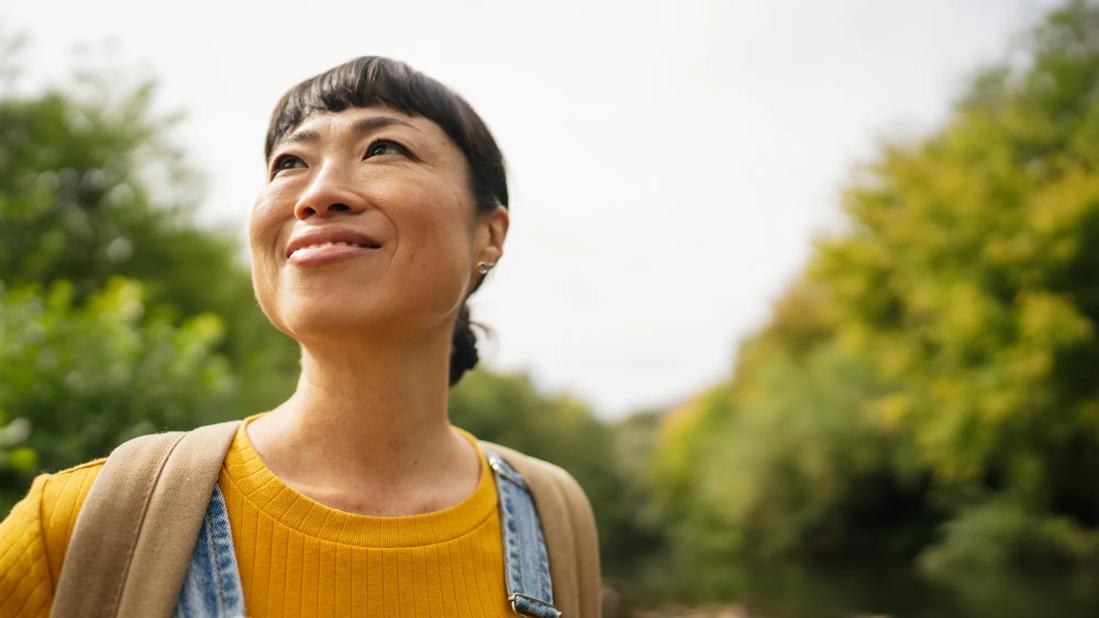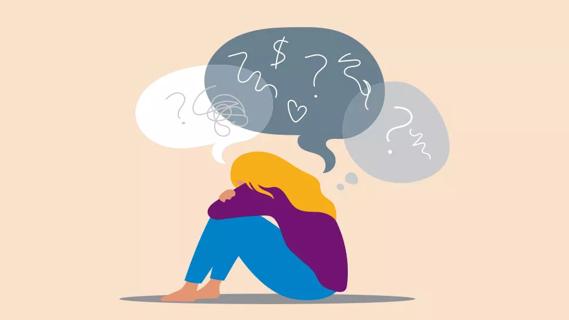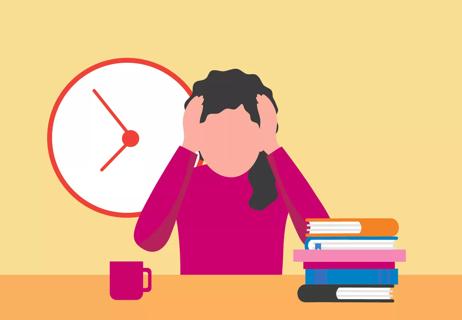Deep breathing, positive mantras and tackling negative thoughts can help get you out of your head and cool down your anxiety

You have deadline pressures at work. Your relationship is getting complicated. Your kid is having problems at school. Maybe you even have a health concern nagging at you. Before you know it, it can feel like anxiety has taken over your life. So much so that you’re feeling a sense of dread even when nothing stressful is happening.
Advertisement
Cleveland Clinic is a non-profit academic medical center. Advertising on our site helps support our mission. We do not endorse non-Cleveland Clinic products or services. Policy
“Anxious thoughts activate the limbic system, the fear center in our brain,” says psychologist Susan Albers, PsyD. “Just a simple thought can easily trigger this part of the brain in a split second. I think of anxiety to be like walking around with an umbrella waiting for it to thunderstorm.”
The annoying thing about anxiety is that it’s fairly impossible to avoid. It’s a basic human emotion, and we all feel it at times. After all, it’s normal to worry about a make-or-break work deadline or a serious medical diagnosis.
But when you worry all the time, or when anxiety interferes with everyday life, it’s a problem. “It’s an overwhelming, out-of-control feeling, and it can feel like it comes out of nowhere,” she adds.
Dr. Albers gives some pointers on how to work through anxious thoughts and find peace within your mind.
It may sound like a cliché (or an irritating way to tell someone to “calm down”). But in fact, your breath is an excellent tool for calming your body.
Think of yourself as a firefighter and your anxiety is a fire. You can put out the flames of anxiety with some cool breaths. Breathe in and out, deeply and slowly.
You can practice breathing whenever anxiety hits — at work, on your daily commute or even before bed. “As you move through your day, pay attention to your breathing,” Dr. Albers advises. “Regularly stopping to take some full, deep breaths keeps your brain from reaching the tipping point where anxiety takes over because you have been shallow breathing or holding your breath without realizing it.”
Advertisement
Try breathing techniques like:
“When you slow down your breathing, you trick your body into thinking you’re relaxing or going to sleep,” she explains.
When we feel anxiety, it can often cause an avalanche of nasty thoughts. “Thoughts like, ‘I can’t stand this; this is awful!’ fuel the fire of anxiety,” points out Dr. Albers. While it’s good to validate your feelings, don’t let the spiral of these thoughts take you over.
“Remind yourself that you encounter stressful things every single day, and you find ways to handle them. Bad things happen relatively sparingly and our brains are well-equipped to handle a crisis if one occurs,” she adds. “Be engaged in your real life, not in imagined moments, and don’t create ‘what ifs.’”
The best way to begin is to work on developing a new relationship with your thoughts, which is sometimes easier said than done! But you can do this by trying to catch negative thoughts in the moment and becoming mindful of them, instead of entertaining them.
For example, if you’re in the shower and you start thinking about a negative situation that happened at work, this may cause you to go into an anxiety spiral. Instead, try and tell yourself: “I’m having this thought and it’s OK to be aware of it. But I’m not going to entertain it any further.”
Instead, Dr. Albers suggests thinking about what you can and cannot change about the situation. Then, take steps to change what you can, and work on accepting what you can’t.
One of the best ways to get out of your head is to bring yourself back to the present. This is where your senses can help guide you out of spiraling, anxious thoughts.
“Focusing on a sensory experience moves you out of your head, away from your thoughts and directly into your body,” explains Dr. Albers.
A good technique is the 5-4-3-2-1 exercise to tune into your surroundings:
Advertisement
When you’re in a state of anxiety, your brain is trying to convince you that you are in physical harm’s way, even when you’re actually not. So, it can be helpful to say things out loud (even if it’s to yourself) to contradict those messages your brain is sending you.
When your anxiety wheel starts spinning, repeat these words to yourself:
“Positive, truthful words are helpful as an affirmation. What we say can become our reality,” Dr. Albers notes.
“Thoughts are like clouds. They’re not good or bad, they just come and go,” she says. “You don’t have to react to them — ‘Oh, wow, that’s interesting. I wonder where that thought came from,’ works better than ‘Oh, no, that’s terrible.’ Being grounded in the present moment, without judgment, is the place to be.”
Don’t worry — we’re not talking about feeding into toxic positivity. But even when difficult things are happening, there are usually some good things to notice.
And the more attention you give those good things, the easier it will be for your brain to notice the good instead of the bad. “Our perspective is powerful,” Dr. Albers emphasizes. “Focusing on the things you’re grateful for is a great way to pull yourself out of anxiety.”
Advertisement
Anxiety can stem from needless worry about a lot of things that aren’t important in the long run. “Consider how this will really impact you in five minutes, five months or five years,” she recommends.
Anxious thoughts can make you feel alone and, in many ways, powerless. When you’re in this state, it’s a good time to pull strength from the things that inspire you.
How can your mind serve you something empowering instead of destructive?
Maybe it’s a role model who you admire and look up to. Maybe it’s your spiritual beliefs. Or it could be an accomplishment from your past that you’re proud of. “Tapping into those sources of strength can bring a sense of calm, comfort and safety,” Dr. Albers states.
A racing brain is a hallmark of anxiety. Yet the feeling isn’t just in your head. Anxiety affects your whole body, including your heart rate and breathing patterns.
To dial down the anxiety, Dr. Albers says you can use tools to address both body and mind. Try some yoga stretches, or take a tennis ball and rub it under your foot or behind your back. “Find gentle ways to calm your body,” she suggests.
Other techniques may vary based on what you find calming to your body. Maybe it’s a quick run around the park to take the edge off. Or maybe it’s having a hot (or cold) shower to “reset” your nervous system.
Advertisement
If you still feel like you’re drowning in worry, it’s OK to reach for a life raft. Counselors and therapists have a lot of experience treating anxiety — and it can be successfully treated. “It’s been proven that simply naming your feelings can help calm you down,” Dr. Albers points out. “This is easier to do when you share your feelings with others.
“Anxiety is more common than people realize. You might feel embarrassed, but the truth is that this is part of being a human, and it’s OK to ask for help.”
Just like there are things that can soothe your anxiety, there are also things you should steer clear of. “Avoid soothing your anxiety with things that can lead to more anxiety,” advises Dr. Albers.
If you’re experiencing anxiety, here are some things to avoid:
Anxiety can leave you feeling out of control. But that doesn’t mean you have to let it take over your life. Having different techniques and healthy coping mechanisms in your anxiety toolkit can make you feel more in control of your mind and feelings.
“Sometimes, you just have to let anxiety come and go, like riding a wave,” says Dr. Albers. Remember that it’ll fade and that “This, too, shall pass.”
At the same time, it’s good to know that you can always ask for help if it gets to be too much. “If these tools aren’t working or your anxiety is becoming more intense or more frequent, it’s helpful to seek out someone to talk to,” Dr. Albers reiterates.

Sign up for our Health Essentials emails for expert guidance on nutrition, fitness, sleep, skin care and more.
Learn more about our editorial process.
Advertisement

Going home isn’t always easy, but there are ways to ease any stress you might feel

Managing stress can help you sleep more soundly

This fast-acting anxiety medication should never be taken with alcohol, despite what you may see on The White Lotus

Focusing on what you can see, feel, touch and hear can help you feel more present in the moment

Performance anxiety and stage fright are outsized stress responses that can creep up when you’re put on the spot

A healthy amount of anxiety can keep you safe from harm and motivate you to take action

Although different conditions, they can occur together or cause one another

Breathwork, sleep meditation and avoiding screens can help fight back morning anxiety

Even small moments of time outdoors can help reduce stress, boost mood and restore a sense of calm

A correct prescription helps your eyes see clearly — but as natural changes occur, you may need stronger or different eyeglasses

Both are medical emergencies, but they are very distinct events with different causes